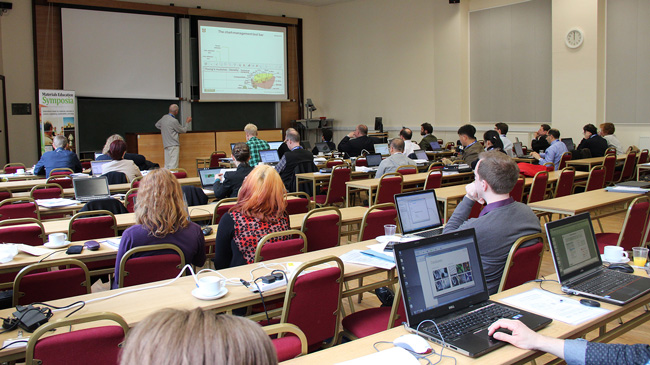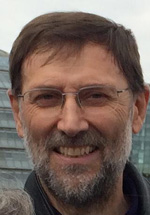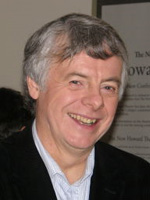Short Course and Workshops
8th International
Materials Education Symposium (Archived Information)
April 5-6, Cambridge University Materials Science Department
Optional short courses and workshops preceded the main Materials Education Symposium.
Tuesday & Wednesday |
Wed Afternoon |
Wed Afternoon |
Wed Afternoon |
Course leader: |
Workshop: eLearning for the Materials World Organisers: |
Workshop: Materials and Sustainable Development Organisers: |
Workshop: Introduction to CES Selector Organisers: |
CES EduPack Short Course
When: April 5 (9:30-17:00); April 6 (9:00-12:30)
Organiser: Granta Design
Cost: Full Event package (£437 before Dec 31) includes this course, the Symposium, and any Wednesday Workshop.

Who is the course for?
Anyone new to the CES EduPack teaching resources, or seeking a refresher. Professors, Lecturers, and Program Directors of university and college courses related to materials and manufacturing. The course is relevant to the following disciplines: mechanical engineering; production engineering; aerospace engineering; materials science and engineering; industrial and product design; polymer science and engineering; eco-engineering; chemical engineering; bio-engineering; and architecture and the built environment.
What is the course about?
CES EduPack has been created by Professor Mike Ashby of Cambridge University and his colleagues over the past 20 years. Both the resources that it provides and the ideas that it implements are valuable to educators across a broad range of engineering-related courses, and from first to final-year teaching. They have been used to support and reinforce existing courses that use a variety of teaching approaches and texts, as well as in the design of new courses.
At the heart of CES EduPack is a database of materials and process properties, supported by textbook-style explanations of materials attributes and behavior. This provides a rich, interactive information resource that can engage students with the world of materials. The CES EduPack software applies the information in the database, enabling exercises and projects to analyze and compare materials properties, and to select materials for engineering applications. These computer-based learning tools are augmented with PowerPoint lectures, teaching resource books, student projects and exercises, and textbooks.
The course will show, through lectures interspersed with hands-on tutorial sessions using the software, how such resources can assist materials teaching.
Note: attendees will need to bring their own laptop computers for the hands-on sessions, and will be provided with the new CES EduPack software. Please ensure this is a Windows machine and that you have administrator privileges.
Tue, April 5, Day One—Introduction to CES EduPack
The course will consist of a series of units, each including a short lecture, a software demonstration, discussion time, and a "hands-on session" during which attendees can use the CES EduPack software. Members of the Granta education team will be present to help and to answer questions.
| 09:30 | Registration & refreshments |
| 10:00 | Course opens—Welcome |
| 10:05 | Introductions, Teaching Resources Website and Agenda Review (Mike Ashby) |
| 10:15 | Unit 1-2: Materials, Data and Charts for CES EduPack (Mike Ashby) |
| 11:15 | Hands-on exercises |
| 11:40 | Unit 4: Manipulating Properties: composition, microstructure, architecture (Hugh Shercliff) |
| 12:15 | Hands-on exercises |
| 12:30 | Lunch |
| 13:30 | Unit 6-7: Materials Selection (Claes Fredriksson) |
| 14:30 | Hands-on exercises |
| 15:00 | Coffee & refreshments |
| 15:30 | Unit 12: Eco-selection and the Eco Audit Tool: introducing students to life-cycle thinking (Mike Ashby) |
| 16:15 | Hands-on exercises |
| 16:45 | Advanced CES EduPack Databases: Standard Level 3, Bioengineering, Polymer Aerospace and Sustainable Development (Hannah Melia) |
| 17:15 | Wrap up & discussion (Mike Ashby). Course evaluation. |
| 17:30 | Close |
Weds, April 6, Day Two—Advanced Materials Selection
| 09:00 | Registration & refreshments |
| 09:30 | Course opens—Welcome. Brief review of Day 1 (Mike Ashby) |
| 09:45 | Unit 8: Objectives in Conflict (Claes Fredriksson) |
| 10:15 | Hands-on exercises |
| 10:30 | Advanced Industrial Case Studies (interactive) |
| 11:30 | The Synthesizer tool (Dr Lee Phillips) |
| 12:15 | Wrap up & discussion (Mike Ashby). Course evaluation. |
| 12:30 | Lunch |
| 13.15 | Registration for parallel workshop sessions (CES Selector, e-Learning, Sustainability) |
eLearning for the Materials World Mark Endean, Andrew Green, Bill Clyne, Alec Goodyear, Noel Rutter |
Materials and Sustainable Development Mike Ashby, Tatiana Vakhitova |
Charlie Bream, Claes Fredriksson |
| 13:30 | Workshops (first half) |
| 15.00 | Coffee & refreshments |
| 15.30 | Workshops (second half) |
| 17.00 | Wrap up & discussion. Workshop evaluation |
| 17.30 | Close |
| 17.30 | Tour of the Materials Science and Metallurgy department |
| 18.00 | Travel to Clare College, Memorial Court |
Workshop: eLearning for the Materials World
When: April 6, 13:30-17:30
Cost: Adds £20 to Symposium fee (covers catering and administration); included free for Short Course attendees.
Facilitators:
|
|
|
The materials community has led the field on the development of elearning resources. Beginning with Materials Science on CD-ROM in the 1990s and continuing to DoITPoMS, developed at the University of Cambridge, and the CORE-Materials repository of open educational resources, the materials educator has been able to draw on a very wide range of digitised content and active learning resources to incorporate in their teaching.
Effective online learning requires careful design of learning activities based on principles that are gradually emerging from collective experience. There is a world of difference between making lecture notes and recordings accessible online and presenting materials specifically developed for students to learn from independently.
This workshop will provide an opportunity to review your own and others’ practice in materials elearning and develop some new ideas to enhance your students’ learning experience. The workshop facilitators will introduce examples of online resources and illustrate how these are adapted into effective learning provision. You will be able to draw on and share your own experience of online learning as a teacher or learner. Then, using guidelines for good practice in online learning, you will be able to create an outline for a new learning activity to develop for your learners.
The facilitators come from the conventional and the distance learning sectors and together have over a century of experience in developing and presenting learning in materials both traditionally and online.
Workshop Format and Outcomes
The workshop will interleave short presentations and demonstrations from the facilitators with small group work involving the participants. At the conclusion to the workshop, you should be able to:
- locate reputable online learning resources with appropriate rights clearances to incorporate in your teaching programme
- construct an effective short elearning experience to meet your learners’ requirements
- engage your immediate peer community in the issues covered by the workshop.
Outline Program:
| Session 1 | Perspectives, resources and repositories The online learning landscape in materials – available resources and what they provide; gaps in provision. |
| Session 2 | Current eLearning practice |
| Session 3 | Making a plan by the OU. |
Pre-course Preparation:
The facilitators are aiming for active involvement of all participants. To gain the most from the workshop, please think about the following questions and bring with you appropriate resources to contribute to the discussions.
- What experience have I had as a learner of traditional distance learning and/or elearning?
- What have I provided to my students in the form of traditional distance learning or elearning?
- What have I myself already learnt about the process of learning online?
- What would I like to be able to present as elearning?
Materials and Sustainable Development Workshop
When: April 6, 13:30-17:30
Organiser: Granta Design
Cost: Adds £90 to Symposium fee; included free for Short Course attendees
The workshop will be led by Professor Mike Ashby and Dr Tatiana Vakhitova.
This workshop enables educators to go through a five-step methodology for analysing Sustainable Development articulations in the context of Materials, as well as to use resources to support teaching Sustainable Development concepts. The participants are expected to have a general knowledge of Engineering and/or Science. The methodology can be used in teaching interdisciplinary courses with politics, business and engineering students working together. The resources have been developed by Granta Design in collaboration with the University of Cambridge, Barcelona (UPC) and the University of Illinois at Urbana Champaign. You will need a computer running Microsoft Windows to practise exercises with the software provided.
A "sustainable development" is one that contributes in an equitable way to human welfare, doing so in a way that minimizes the drain on natural resources, complies with the rule of law, and is financially viable. Many civil, commercial, government, and academic projects claim to do this, and many of them have implications for materials consumption and use e.g. developing biopolymers, subsidizing electric cars, and requiring photo-voltaic (PV) panels on new residential buildings. We refer to them as "articulations" of sustainable development. But how are they to be assessed? There is no simple, "right" answer to questions of sustainable development. Instead there is a thoughtful, well-researched analysis of a proposed articulation that recognizes the concerns of stakeholders, the demands these articulations create for materials and energy, the economic, legal, and social constraints, and their environmental legacy.
Workshop: Introduction to CES Selector
When: April 6, 13:30-17:30
Organiser: Granta Design
Cost: Adds £90 to Symposium fee; included free for Short Course attendees.
This workshop will be led by Dr Charlie Bream.
Workshop facilitator: Claes Fredriksson
What is the course about?
This session provides an introduction to the CES Selector software, used in industry and research for materials selection and decision-making, and to support advanced teaching of materials.
CES Selector is the industrial version of CES EduPack, used to select and compare materials in industry, research and advanced teaching. Here the primary aim is to help people rapidly identify candidate materials, so they can justify and focus their development efforts on the most promising solutions. To support this, CES Selector includes additional efficiency tools that let you get to results and make decisions faster and more effectively. These include the ‘Performance Index Finder’ that enables material indices to be quickly defined and plotted, the ‘Find Similar’ tool for finding drop-in replacements with minimal information on the design requirements, ‘Comparison tables’ for identifying the differences between materials or ‘key’ properties that you may have overlooked, as well as CES Constructor, a software toolkit that lets you add your own data and modify existing databases in the platform.
In the workshop, you will see demonstrations and be able to try the software yourselves with a time-limited license. There will also be case studies showing how the tools and features can be used to solve real industrial problems. You will need a computer running Microsoft Windows to follow the exercises with the software provided.
Attendees of this workshop will also receive a 30 day trial of CES Selector.
More information on CES Selector »
Course and workshop presenters











